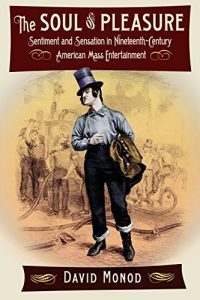Show business is today so essential to American culture it's hard to imagine a time when it was marginal. But as David Monod demonstrates, the appetite for amusements outside the home was not "natural": it developed slowly over the course of the nineteenth century. The Soul of Pleasure offers a new interpretation of how the taste for entertainment was cultivated. Monod focuses on the shifting connection between the people who built successful popular entertainments and the public who consumed them. Show people discovered that they had to adapt entertainment to the moral outlook of Americans, which they did by appealing to sentiment.
The Soul of Pleasure explores several controversial forms of popular culture—minstrel acts, burlesques, and saloon variety shows—and places them in the context of changing values and perceptions. Far from challenging respectability, Monod argues that entertainments reflected and transformed the audience’s ideals. In the mid-nineteenth century, sentimentality not only infused performance styles and the content of shows but also altered the expectations of the theatergoing public. Sentimental entertainment depended on sensational effects that produced surprise, horror, and even gales of laughter. After the Civil War the sensational charge became more important than the sentimental bond, and new forms of entertainment gained in popularity and provided the foundations for vaudeville, America’s first mass entertainment. Ultimately, it was American entertainment’s variety that would provide the true soul of pleasure.






